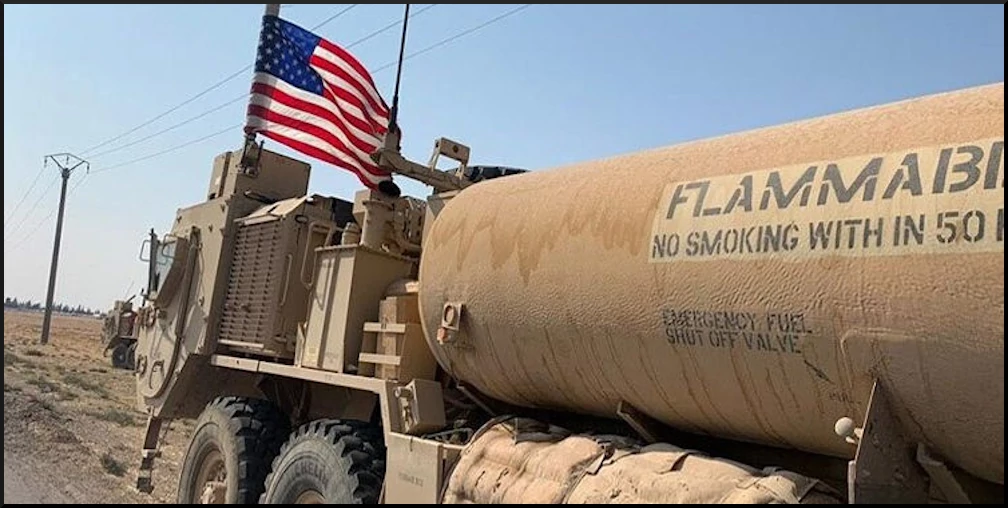from The News Desk at The Cradle, April 22, 2023
The US occupation forces continue to steal and loot Syrian wealth, transporting dozens of tankers loaded with stolen oil from the northeast Jazeera region across the border and into Iraqi territory in recent days, Syrian state media SANA reported on 22 April.
Private sources from the countryside of Al-Yarubiya told SANA that the US occupation transported a convoy of 34 tankers loaded with stolen oil through the illegal Mahmoudiya crossing, in addition to transporting 40 additional tankers through the illegal Al-Waleed crossing to Iraqi territory.
On 11 April, the US occupation transported a convoy of 77 vehicles, including 32 tankers filled with oil stolen from Syrian fields and 6 military armored vehicles, from the Hasaka countryside through the Al-Waleed crossing as well.
As William Van Wagenen detailed in a report for the Libertarian Institute, Western efforts to loot Syrian oil date back to April 2013, at the height of the US-led covert war to topple the Syrian government.
Syria’s main oil-producing fields lie in the sparsely populated east of the country, in the Deir Ezzor province, near the Iraqi border. In April 2013, militants from the US-backed Free Syrian Army (FSA) and from the al-Qaeda-affiliated Nusra Front jointly assaulted Deir Ezzor province and captured 95 percent of the oil fields in the province.
As the Financial Times (FT) reported, EU foreign ministers then “lifted an oil embargo against Syria to allow rebels to sell crude to fund their operation.”
Time Magazine reported that “As part of the decision, the EU ministers also agreed to export technical equipment, ensure the rebels’ shipments of oil and invest in the rebel oil businesses,” and that “Since the regime controls the oil pipelines, as well as the existing export terminals on the Mediterranean, rebel groups would have to truck barrels of oil across rebel territory into Turkiye, where the nearest refineries are situated and where they could—if they can produce enough oil—export to the rest of Europe.”
Time noted, however, that “Complicating the issue is the fact that several of the rebel-held oil fields are believed to be under the control of Jabhat al-Nusra, which has declared its allegiance to al-Qaeda.”
Lebanese As-Safir reported that over the next year, the Turkish government “facilitated the cross-border smuggling of oil, taking advantage of the European Union’s decision.”
Academic and Syria expert Joshua Landis noted the importance of controlling the oil fields, explaining that “Whoever gets their hands on the oil, water, and agriculture holds Sunni Syria by the throat” and that “the logical conclusion from this craziness is that Europe will be funding Al-Qaeda.”
ISIS later captured these oil fields and the concomitant smuggling infrastructure required to profit from them after taking control of Deir Ezzor province from Nusra and the FSA in 2014. The smuggling of oil through Turkiye became ISIS’ main source of revenue, netting the group some $1.5 million per day at its height.
According to an August 2012 Defense Intelligence Agency (DIA) report, US planners welcomed the establishment of a “Salafist principality” of the sort created by ISIS in eastern Syria and Western Iraq.
However, in late 2015, when Russia intervened militarily to prevent Damascus from falling to ISIS, the Nusra Front, and their allies in the FSA, US planners changed strategy and began partnering with the Kurdish People’s Protection Units (YPG) to defeat ISIS. US planners wished to capture as much of the territory under ISIS control as possible in a race with the Syrian and Russian militaries to eliminate the extremist organization.
The US and YPG (re-branded as the Syrian Democratic Forces, or SDF) successfully captured large swathes of territory from ISIS, including Syria’s crucial oil and grain-producing regions. This allowed US planners to maintain leverage in the conflict against the Syrian government and has allowed US and SDF forces to loot Syrian oil and wheat since that time, with large convoys regularly moving goods across the border to Iraq.
Though US officials state they occupy Syria’s northeast to prevent the return of ISIS, Syria analyst Jennifer Cafarella of the Institute for the Study of War noted another reason for the continued US military occupation in northeastern Syria. She observed in 2017 that “Whether Washington chooses to admit it or not, the US now has direct influence over the vast majority of Syria’s most productive oil fields,” and that the territorial gains of the SDF “are Syrian national treasures that when added up amount to brute geopolitical power for the US.”
 Syria Support Movement solidarity with the Syrian people
Syria Support Movement solidarity with the Syrian people





